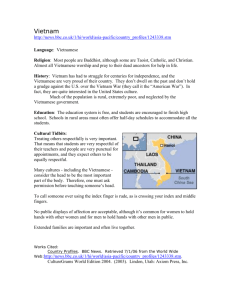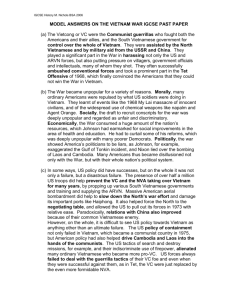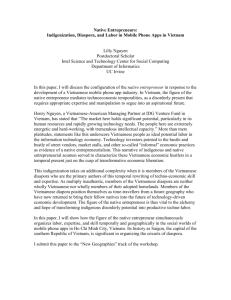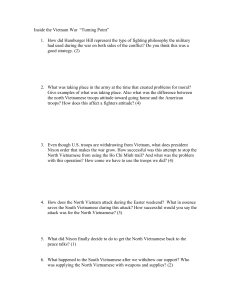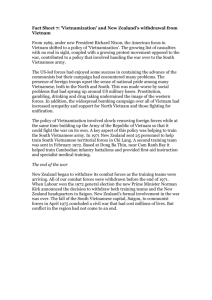Vietnam
advertisement
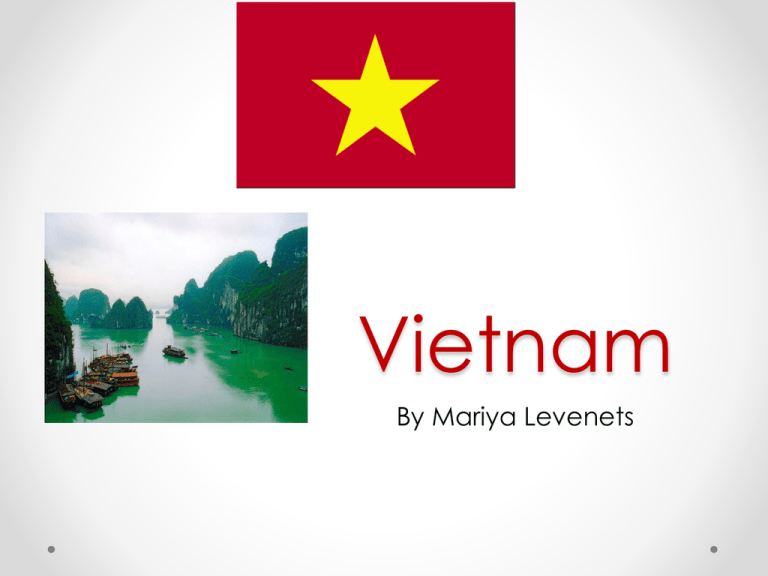
Vietnam By Mariya Levenets Introduction • Location: Southeast Asia • Formal Name: Socialist Republic of Vietnam • Capital: Hanoi • Population: 83.5 million and grows by 1.04 percent. Culture • Worship of ancestors • Holidays o There are eleven lunar holidays • Tet nguyen dan (Lunar New Year) • Tet thuong nguyen • Tet trung nguyen • Attitudes o Respect teachers and parents. • Dress o Special Occasion • Women • Men Customs • Formal Greeting: Shake hands • Other: Greet verbally and bow the head slightly. As well, maintain about three feet of distance. • Men are considered as the authority. • Women are supposed to take care of the children in the family. Prejudices • Vietnamese were not allowed citizenship in Cambodia and were removed from their place of residence. • About 200,000 out of 450,000 Vietnamese were murdered. • Many were forced to move to South Vietnam. • About 150,000 ethnic Vietnamese were forced to migrate to Vietnam. Injustices • During the Vietnam War many innocent children, women, and children were killed. • Innocent children and women were killed during the My Lai incident. • More than 500 women, children, and men were killed. • Some of the United States soldiers raped women and teenagers and then killed the victims. Stereotypes and Negative Images • Vietnamese are ‘gooks’. • Vietnamese are stereotyped as generalizing that they are people living in a third world country in Asia. Positive Images • Vietnamese are very respectful people. • The Vietnamese appreciate kindness and hard work. Taboos • • • • • Touching someone’s head Waving index finger to get someone’s attention Crossing index fingers Using many hand gestures Hands on hips or arms crossed on the chest Tips for Teachers • • • • Be on time Direct contact is not suggested Respect personal space No touching during a conversation Tips for Teachers • Provide notes to the student written in simple English. • Avoid taboos to prevent miscommunication. • Address the topic of the Vietnam War carefully. • Useful phrases: o Xin chao (Formal Greeting) o Co khoe khong? (How are you doing?) References • Brigham Young University & ProQuest Information and Learning Company. (2007). Asia and Oceania. Provo, UT: ProQuest Information and Learning Co. • Cookman, Claude. (2007). An American atrocity: the my lai massacre concretized in a victim’s face. Journal of American History, 94(1), 154-162. Retrieved from http://search.ebscohost.com/ogin.aspx?direct=true&db=aph&AN=25498521 &site=ehost-live • Enhrentraut, S. (2011). Perpetually temporary: citizenship and ethnic Vietnamese in Cambodia. Ethnic and Racial Studies, 34(5), 779-798. Retrieved from http://search.ebscohost.com/login.aspx?direct=true&db=sih&AN=59877112 &site=ehost-live References • Maguire, M., & Saris, Jamie. (2007). Enshrining Vietnamese-Irish lives. Anthropology Today, 23(2), 9-12. Retrieved from http://search.ebscohost. com/login.aspx?direct =true&db=sih&AN =24596298&site=ehost-live • Juan, Karin Aguilar–San. (2009). Little saigon’s : staying Vietnamese in America. from http://site.ebrary.com/ lib/molloy/docDetail.action?docID=10353992 • Vietnam. (n.d.). Retrieved April 1, 2012, from http://www.culturecross ing.net/ basics_business_ student _details.php?Id=7&CID=223 Retrieved
![vietnam[1].](http://s2.studylib.net/store/data/005329784_1-42b2e9fc4f7c73463c31fd4de82c4fa3-300x300.png)

